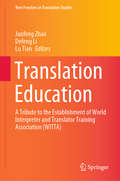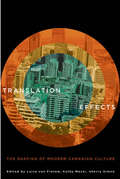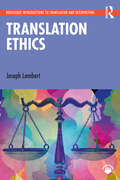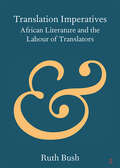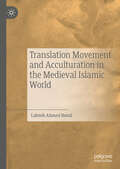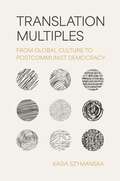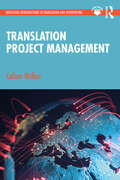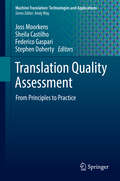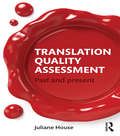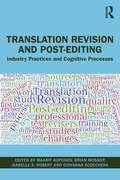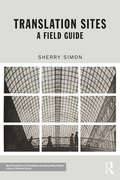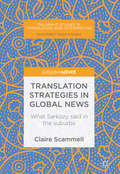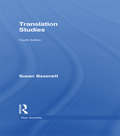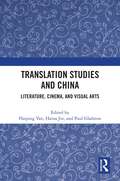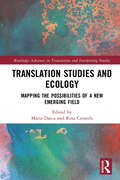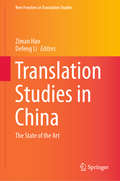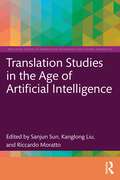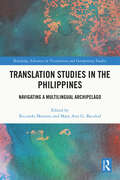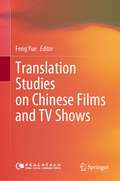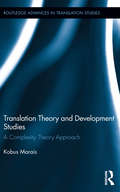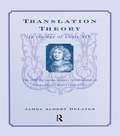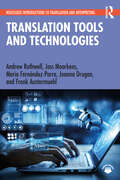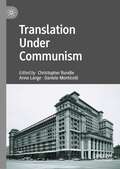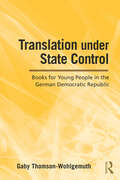- Table View
- List View
Translation Education: A Tribute to the Establishment of World Interpreter and Translator Training Association (WITTA) (New Frontiers in Translation Studies)
by Defeng Li Junfeng Zhao Lu TianThis book features invited contributions based on the presentations at the First World Interpreter and Translator Training Association (WITTA) Congress, held in Guangzhou, China, in November 2016. Covering a wide range of topics in translation education, it includes papers on the latest developments in the field, theoretical discussions, and the practical implementation of translation courses and programs. Given its scope, the book appeals to translation scholars and practitioners, education policymakers, and language and education service providers.
Translation Effects
by Luise Von Flotow Sherry Simon Kathy MezeiMuch of Canadian cultural life is sustained and enriched by translation. Translation Effects moves beyond restrictive notions of official translation in Canada, analyzing its activities and effects on the streets, in movie theatres, on stages, in hospitals, in courtrooms, in literature, in politics, and across café tables. The first comprehensive study of the intersection of translation and culture, Translation Effects offers an original picture of translation practices across many languages and through several decades of Canadian life. The book presents detailed case studies of specific events and examines the reverberation and spread of their effects. Through these imaginative, at times unusual, investigations, the contributors unveil the simultaneous invisibility and omnipresence of translation and present a cross-cut of Canadian translation moments. Addressing the period from the 1950s to the present and including a wide scope of examples from medical interpreting to film dubbing, the essays in this book create a panoramic view of the creation of modern culture in Canada. Contributors include Piere Anctil (University of Ottawa), Helene Buzelin (Université de Montréal), Alessndra Capperdoni (Simon Fraser University), Philippe Cardinal, Andrew Clifford (York University), Beverley Curran, Renée Desjardins (University of Ottawa), Ray Ellenwood, David Gaertner, Chantal Gagnon (Université de Montréal), Patricia Godbout, Hugh Hazelton, Jane Koustas (Brock University), Louise Ladouceur ( Université de l'Albera, Gillian Lane-mercier (McGill University), George Lang, Rebecca Margolis, Sophie McCall (Simon Fraser University), Dolmaya McDonough, Denise Merkle (Université de Moncton), Kathy Mezei, Sorouja Moll, Brian Mossop, Daisy Neijmann, Glen Nichols ( Mount Allison University), Joseph Pivato, Gregory Reid, Robert Schwartzwald, Sherry Simon, Luise von Flotow (University of Ottawa), and Christine York.
Translation Effects: The Shaping of Modern Canadian Culture
by Kathy Mezei, Sherry Simon and Luise von FlotowMuch of Canadian cultural life is sustained and enriched by translation. Translation Effects moves beyond restrictive notions of official translation in Canada, analyzing its activities and effects on the streets, in movie theatres, on stages, in hospitals, in courtrooms, in literature, in politics, and across café tables. The first comprehensive study of the intersection of translation and culture, Translation Effects offers an original picture of translation practices across many languages and through several decades of Canadian life. The book presents detailed case studies of specific events and examines the reverberation and spread of their effects. Through these imaginative, at times unusual, investigations, the contributors unveil the simultaneous invisibility and omnipresence of translation and present a cross-cut of Canadian translation moments. Addressing the period from the 1950s to the present and including a wide scope of examples from medical interpreting to film dubbing, the essays in this book create a panoramic view of the creation of modern culture in Canada. Contributors include Piere Anctil (University of Ottawa), Hélène Buzelin (Université de Montréal), Alessandra Capperdoni (Simon Fraser University), Philippe Cardinal, Andrew Clifford (York University), Beverley Curran, Renée Desjardins (University of Ottawa), Ray Ellenwood, David Gaertner, Chantal Gagnon (Université de Montréal), Patricia Godbout, Hugh Hazelton, Jane Koustas (Brock University), Louise Ladouceur (Université de l'Albera, Gillian Lane-Mercier (McGill University), George Lang, Rebecca Margolis, Sophie McCall (Simon Fraser University), Julie Dolmaya McDonough, Denise Merkle (Université de Moncton), Kathy Mezei, Sorouja Moll, Brian Mossop, Daisy Neijmann, Glen Nichols (Mount Allison University), Joseph Pivato, Gregory Reid, Robert Schwartzwald, Sherry Simon, Luise von Flotow (University of Ottawa), and Christine York.
Translation Ethics (Routledge Introductions to Translation and Interpreting)
by Joseph LambertTranslation Ethics introduces the topic of ethics for students, researchers, and professional translators. Based on a successful course and written by an experienced instructor, the Introduction and nine core chapters offer an accessible examination of a wide range of interlocking topic areas, which combine to form a cohesive whole, guiding students through the key debates. Built upon a theoretical background founded in philosophy and moral theory, it outlines the main contributions in the area and traces the development of thought on ethics from absolutism to relativism, or, from staunchly-argued textual viewpoints to current lines of thought placing the translator as agent and an active – even interventionary – mediator. The textbook then examines the place of ethical enquiry in the context of professional translation, critiquing provision such as codes of ethics. Each chapter includes key discussion points, suggested topics for essays, presentations, or in-class debates, and an array of contextualised examples and case studies. Additional resources, including videos, weblinks, online activities, and PowerPoint slide presentations on the Routledge Translation studies portal provide valuable extra pedagogical support. This wide-ranging and accessible textbook has been carefully designed to be key reading for a wide range of courses, including distance-learning courses, from translation and interpreting ethics to translation theory and practice.
Translation Imperatives: African Literature and the Labour of Translators (Elements in Publishing and Book Culture)
by Ruth BushThis Element explores the politics of literary translation via case studies from the Heinemann African Writers Series and the work of twenty-first-century literary translators in Cameroon. It intervenes in debates concerning multilingualism, race and decolonization, as well as methodological discussion in African literary studies, world literature, comparative literature and translation studies. The task of translating African literary texts has developed according to political and socio-economic contexts. It has contributed to the consecration of a canon of African classics and fuelled polemics around African languages. Yet retranslation remains rare and early translations are frequently criticised. This Element's primary focus on the labour rather than craft or art of translation emphasises the material basis that underpins who gets to translate and how that embodied labour occurs within the process of book production and reception. The arguments draw on close readings, fresh archival material, interviews, and co-production and observation of literary translation workshops.
Translation Movement and Acculturation in the Medieval Islamic World
by Labeeb Ahmed BsoulThis book investigates the transmission of knowledge in the Arab and Islamic world, with particular attention to the translation of material from Greek, Persian, and Sanskrit into Arabic, and then from Arabic into Latin in medieval Western Europe. While most modern scholarly works have addressed contributions of Muslim scholars to the modern development of translation, Labeeb Ahmed Bsoul bases his study on Arabic classical literature and its impact upon modern translation. He focuses on the contributions made by prominent classical Christian and Muslim scholars, showcasing how their works and contributions to the field of knowledge are still relevant today.
Translation Multiples: From Global Culture to Postcommunist Democracy
by Kasia SzymanskaA new genre of writing demonstrating that translation is neither a transparent medium nor a secondary form of literatureIn Translation Multiples, Kasia Szymanska examines what happens when translators, poets, and artists expose the act of translation by placing parallel translation variants next to one another in a standalone work of art, presenting each as a legitimate version of the original. Analyzing such &“translation multiples&” as a new genre of writing, Szymanska explores how an original text can diverge into variants, how such multiplicity can be displayed and embraced, and how the resulting work can still be read as a coherent text. To do so, she focuses on contemporary projects in two different contexts—Anglophone experimental practices and post–1989 Poland&’s emergence into democracy—while viewing them against the backdrop of twentieth-century cultural and political developments.Szymanska first takes a broad look at Anglophone global culture, debunking the myth of translation as a transparent medium and an unoriginal, secondary form of writing. She then turns to postcommunist Poland, where projects introducing multiple translation variants with different ideological readings offered an essential platform for pluralist political discussion. She examines in particular an elaborate metatranslation of &“La Marseillaise&”; a triple rendering of Anthony Burgess&’s novel A Clockwork Orange; and a quadruple book of Bertolt Brecht&’s poetry with distinct readings by four translators. She argues that the creators of such multiples want to tell their own stories—personal, critical, visual, or political. Showing why multiple translations matter, Szymanska calls for a redefined practice of reading translations that follows the ethics of the multiple.
Translation Project Management (Routledge Introductions to Translation and Interpreting)
by Callum WalkerThis textbook provides a comprehensive overview of the processes, principles, and constraints of project management in the translation industry. It offers readers clear insights into modern-day project management practices specific to translation services and an understanding of critical inter-related aspects of the process, drawing on key works in business studies on management, aspects of economics relevant to project management, and international standards on project management processes. Developed on the back of a successful module titled Intercultural Project Management, Translation Project Management provides a coherent account of the entire translation project management lifecycle from start to finish and pays considerable attention to the factors influencing decision- making at various stages and how external forces shape the way in which a translation project plays out. Through an array of real-world case studies, it offers readers opportunities to explore, analyse, and engage with six fundamental project constraints: cost, time, scope, quality, benefits, and risk. Each chapter offers discussion points, possible assignments, and guided further reading. This is an essential textbook both for all project management courses within translation studies programmes and for professional translators and translation service providers.
Translation Quality Assessment: From Principles to Practice (Machine Translation: Technologies and Applications #1)
by Joss Moorkens Sheila Castilho Federico Gaspari Stephen DohertyThis is the first volume that brings together research and practice from academic and industry settings and a combination of human and machine translation evaluation. Its comprehensive collection of papers by leading experts in human and machine translation quality and evaluation who situate current developments and chart future trends fills a clear gap in the literature. This is critical to the successful integration of translation technologies in the industry today, where the lines between human and machine are becoming increasingly blurred by technology: this affects the whole translation landscape, from students and trainers to project managers and professionals, including in-house and freelance translators, as well as, of course, translation scholars and researchers. The editors have broad experience in translation quality evaluation research, including investigations into professional practice with qualitative and quantitative studies, and the contributors are leading experts in their respective fields, providing a unique set of complementary perspectives on human and machine translation quality and evaluation, combining theoretical and applied approaches.
Translation Quality Assessment: Past and Present
by Juliane HouseTranslation Quality Assessment has become one of the key issues in translation studies. This comprehensive and up-to-date treatment of translation evaluation makes explicit the grounds of judging the worth of a translation and emphasizes that translation is, at its core, a linguistic art. Written by the author of the world’s best known model of translation quality assessment, Juliane House provides an overview of relevant contemporary interdisciplinary research on intercultural communication and globalization research, corpus and psycho- and neurolinguistic studies. House also acknowledges the importance of socio-cultural and situational context in which texts are embedded, and which need to be analysed when they are transferred through space and time in acts of translation but also highlights the linguistic art form of translation. The text includes a newly revised and presented model of translation quality assessment which, like its predecessor, relies on detailed textual and culturally informed contextual analysis and comparison. The test cases also show that there are two steps in translation evaluation: firstly analysis, description and explanation; secondly, judgements of value, socio-cultural relevance and appropriateness. The second is futile without the first: to judge is easy, to understand less so. Translation Quality Assessment is an invaluable resource for students and researchers of Translation Studies and Intercultural Communication, as well as for professional translators.
Translation Revision and Post-editing: Industry Practices and Cognitive Processes
by Maarit Koponen; Brian Mossop; Isabelle S. Robert; Giovanna ScoccheraTranslation Revision and Post-editing looks at the apparently dissolving boundary between correcting translations generated by human brains and those generated by machines. It presents new research on post-editing and revision in government and corporate translation departments, translation agencies, the literary publishing sector and the volunteer sector, as well as on training in both types of translation checking work.This collection includes empirical studies based on surveys, interviews and keystroke logging, as well as more theoretical contributions questioning such traditional distinctions as translating versus editing. The chapters discuss revision and post-editing involving eight languages: Afrikaans, Catalan, Dutch, English, Finnish, French, German and Spanish. Among the topics covered are translator/reviser relations and revising/post-editing by non-professionals.The book is key reading for researchers, instructors and advanced students in Translation Studies as well as for professional translators with a special interest in checking translations.
Translation Sites: A Field Guide (New Perspectives in Translation and Interpreting Studies)
by Sherry SimonIn Translation Sites, leading theorist Sherry Simon shows how the processes and effects of translation pervade contemporary life. This field guide is an invitation to explore hotels, markets, museums, checkpoints, gardens, bridges, towers and streets as sites of translation. These are spaces whose meanings are shaped by language traffic and by a clash of memories. Touching on a host of issues from migration to the future of Indigenous cultures, from the politics of architecture to contemporary metrolingualism, Translation Sites powerfully illuminates questions of public interest. Abundantly illustrated, the guidebook creates new connections between translation studies and memory studies, urban geography, architecture and history. This ground-breaking book is both an engaging read for a wide-ranging audience and an important text in broadening the scope of translation studies.
Translation Strategies in Global News: What Sarkozy Said In The Suburbs (Palgrave Studies in Translating and Interpreting)
by Claire ScammellThis book analyses the translation strategies employed by journalists when reporting foreign news events to home audiences. Using English-language press coverage of inflammatory comments made by Nicolas Sarkozy in his role as French interior minister in 2005 as a case study, the author illustrates the secondary level of mediation that occurs when news crosses linguistic and cultural borders. This critical analysis examines the norm for ‘domesticating’ news translation practices and explores the potential for introducing a degree of ‘foreignisation’ as a means to facilitating cross-cultural engagement and understanding. The book places emphasis on foreign-language quotation and culture-specific concepts as two key sites of translation in the news, and addresses a need for research that clarifies where translation, as a distinct part of the newswriting process, occurs. The interdisciplinary nature of this book will appeal to a broad range of readers, in particular scholars and students in the fields of translation, media, culture and journalism studies.
Translation Studies (New Accents)
by Susan BassnettAt a time when millions travel around the planet – some by choice, some driven by economic or political exile – translation of the written and spoken word is of ever increasing importance. This guide presents readers with an accessible and engaging introduction to the valuable position translation holds within literature and society. Leading translation theorist Susan Bassnett traces the history of translation, examining the ways translation is currently utilized as a burgeoning interdisciplinary activity and extending her analysis into developing areas such as developing technologies and new media forms. Translation Studies, fourth edition displays the importance of translation across disciplines, and is essential reading for students and scholars of translation, literary studies, globalisation studies and ancient and modern languages.
Translation Studies and China: Literature, Cinema, and Visual Arts
by Haiping YanFocusing on transculturality, this edited volume explores how the role of translation and the idea of (un)translatability in the transformative complementation of different civilizations facilitates the transcultural connection between Chinese and other cultures in the modern era. Bringing together established international scholars and emerging new voices, this collection explores the linguistic, social, and cultural implications of translation and transculturality. The 13 chapters not only discuss the translation of literature, but also break new ground by addressing the translation of cinema, performance, and the visual arts, which are active bearers of modern and contemporary culture that are often neglected by academics. Through an engagement with these diverse fields, the title aims not only to reflect on how translation has reproduced values, concepts, and cultural forms, but also to stimulate the emergence of new possibilities in the dynamic transcultural interplay between China and the diverse national, cultural-linguistic, and contexts of Europe, the Americas, and Asia. It shows how cultures have been appropriated, misunderstood, transformed, and reconstructed through processes of linguistic mediation, as well as how knowledge, understanding, and connections have been generated through transculturality. The book will be a must read for scholars and students of translation studies, transcultural studies, and Chinese studies.
Translation Studies and Ecology: Mapping the Possibilities of a New Emerging Field (ISSN)
by Maria Dasca Rosa CerarolsThis innovative collection explores the points of contact between translation practice and ecological culture by focusing on the relationship between ecology and translation.The volume’s point of departure is the idea that translations, like all human activities, have a relational basis. Since they depend on places and communities to which they are addressed as well as on the cultural environment which made them possible, they should be understood as situated cultural practices, governed by a particular political ecology. Through the analysis of phenomena that relate translation and ecological culture (such as the development of ecofeminism; the translation of texts on nature; translation in postcolonial contexts; the role of dialect and minority languages in literary translation and institutional language policies and the translation of texts on migration) the book offers interpretive models that contribute to the development of eco-translation. Th volume showcases a comparative and interdisciplinary approach to an emerging disciplinary field which has gained prominence at the start of the 21st century, and places special emphasis on the perspective of gender and linguistic diversity across a wide range of languages.This book will be of interest to students and scholars in translation studies, linguistics, communication, cultural studies, and environmental humanities.
Translation Studies in China: The State of the Art (New Frontiers in Translation Studies)
by Defeng Li Ziman HanThis book features the latest research on translation by a dozen leading scholars of translation studies in China. The themes discussed are diverse, and include: translation policy, literary translation, medical translation, corpus translation studies, teaching translation, translation technologies, media translation, interpreting studies and so on. The contributors are all respected experts on their respective topics. The book reflects the state-of-the-art of translation studies in China, and offers a unique window on the latest thoughts on translation there.
Translation Studies in the Age of Artificial Intelligence (Routledge Studies in Translation Technology)
by Kanglong Liu Riccardo Moratto Sanjun SunSun, Liu, Moratto, and the team of contributors provide an in-depth exploration of the implications of artificial intelligence (AI) in the ever-evolving field of translation studies.With key insights to inform future research on this rapidly evolving field in translation, this book offers a comprehensive understanding of the implications of AI, particularly ChatGPT, across technical, pedagogical, and ethical dimensions. From the evolution of translation competence and quality assessment to methodological shifts in research and pedagogy, the authors shed light on the capabilities and limitations of AI, offering insights into its potential within the realm of translation studies. With fresh perspectives on the intersection of AI and translation studies, the chapters cover critical topics such as evaluating translation quality, translator training, corpus translation studies, and ethical considerations in translation education.By systematically unpacking the implications of AI, this book offers valuable insights for researchers, educators, and practitioners interested in translation and interpreting studies, machine-learning, and the role of AI in translator training and education.
Translation Studies in the Philippines: Navigating a Multilingual Archipelago (Routledge Advances in Translation and Interpreting Studies)
by Riccardo Moratto Mary Ann G. BacolodThe contributors to this book examine the state, development, issues, practices, and approaches to translation studies in the Philippines. The Philippines is a highly multilingual country, with many indigenous languages and regional dialects spoken alongside foreign imports, particularly English and Spanish. Professor Moratto, Professor Bacolod, and their contributors analyse the different roles that translation plays across an extensive range of areas, including disaster mitigation, crisis communication, gender bias, marginalization of Philippine languages, academe, and views on sex, gender, and sexuality. They look at a range of different types of translation, from the translation of biblical texts to audio-visual translation and machine translation. Emphasising the importance of translation as an interdisciplinary field, they use a variety of analytic lenses, including anthropological linguistics, language and culture studies, semantics, structural linguistics, and performance arts, among others. A comprehensive resource for scholars and practitioners of translation, as well as a valuable reference for scholars across a wider range of humanities and social science disciplines in examining the culture, language, and society of the Philippines.
Translation Studies on Chinese Films and TV Shows
by Feng YueThis book explores translation strategies for films and TV programs. On the basis of case studies on subtitle translations, it argues that translators are expected to take into consideration not only linguistic and cultural differences but also the limits of time and space. Based on the editor’s experience working as a translator for TV, journalist, and narrator, this book proposes employing editorial translation for TV translation. Further, in light of statistics on international audiences’ views on Chinese films, it suggests striking a balance between conveying cultural messages and providing good entertainment.
Translation Theory and Development Studies: A Complexity Theory Approach (Routledge Advances in Translation and Interpreting Studies)
by Kobus MaraisThis book aims to provide a philosophical underpinning to translation and relate translation to development. The second aim flows from the first section’s argument that societies emerge out of, amongst others, complex translational interactions amongst individuals. It will do so by conceptualising translation from a complexity and emergence point of view and relating this view on emergent semiotics to some of the most recent social research. It will further fulfill its aims by providing empirical data from the South African context concerning the relationship between translation and development. The book intends to be interdisciplinary in nature and to foster interdisciplinary research and dialogue by relating the newest trends in translation theory, i.e. agency theory in the sociology of translation, to development theory within sociology. Data in the volume will be drawn from fields that have received very little if any attention in translation studies, i.e. local economic development, the knowledge economy and the informal economy.
Translation Theory in the Age of Louis XIV: The 1683 De Optimo Genere Interpretandi (on the Best Kind of Translating) of Pierre Daniel Huet (1630-1721)
by James Albert DeLaterPreeminent in a relatively rare category of separate early modern treatises on translation, the 1683 De optimo genere interpretandi by the polymath cleric Pierre-Daniel Huet (1630-1721) offers a concise introduction to its nature, history, theory, process and practice. Written in the form of a Ciceronian dialogue, On the best kind of translating not only represents Huet's acute and witty defence of the often disparaged literal or word for word model, but also provides illuminating glimpses into the critical and interpretive methods of his age. A guiding premise of this first modern edition and annotated translation of Huet's entire treatise is that, now as then, translation theory and practice are complementaries. Consistent also with this premise is the conscious attempt by DeLater to apply Huet's literal translation model at every stage in the process of producing this annotated translation of his treatise. Among the topics treated in Huet's work are: (1) a definition of translation and its relationship to interpretation; (2) adaptation of translation aims and methods to the subject matter of the original; (3) the translating and glossing of idioms, proverbs, metaphors, puns and ambiguities; (4) translators' priorities, from sense and words to the elusive quality that makes a translation seem an original work; and (5) translation as an independent theoretical discipline. In addition to providing an introduction to Huet's life and works as well as explanatory glosses for his copious sources and various topics in the DOGI, the present work also supplies links between Huet's work and that of current theorists and critics in the field of translation studies.
Translation Tools and Technologies (Routledge Introductions to Translation and Interpreting)
by Andrew Rothwell Joss Moorkens Joanna Drugan María Fernández-Parra Frank AustermuehlTo trainee translators and established professionals alike, the range of tools and technologies now available, and the speed with which they change, can seem bewildering. This state-of-the-art, copiously illustrated textbook offers a straightforward and practical guide to translation tools and technologies. Demystifying the workings of computer-assisted translation (CAT) and machine translation (MT) technologies, Translation Tools and Technologies offers clear step-by-step guidance on how to choose suitable tools (free or commercial) for the task in hand and quickly get up to speed with them, using examples from a wide range of languages. Translator trainers will also find it invaluable when constructing or updating their courses. This unique book covers many topics in addition to text translation. These include the history of the technologies, project management, terminology research and corpora, audiovisual translation, website, software and games localisation, and quality assurance. Professional workflows are at the heart of the narrative, and due consideration is also given to the legal and ethical questions arising from the reuse of translation data. With targeted suggestions for further reading at the end of each chapter to guide users in deepening their knowledge, this is the essential textbook for all courses in translation and technology within translation studies and translator training. Additional resources are available on the Routledge Translation Studies Portal.
Translation Under Communism
by Christopher Rundle Anne Lange Daniele MonticelliThis book examines the history of translation under European communism, bringing together studies on the Soviet Union, including Russia and Ukraine, Yugoslavia, Hungary, East Germany, Czechoslovakia, Bulgaria, and Poland. In any totalitarian regime maintaining control over cultural exchange is strategically important, so studying these regimes from the perspective of translation can provide a unique insight into their history and into the nature of their power. This book is intended as a sister volume to Translation Under Fascism (Palgrave Macmillan, 2010) and adopts a similar approach of using translation as a lens through which to examine history. With a strong interdisciplinary focus, it will appeal to students and scholars of translation studies, translation history, censorship, translation and ideology, and public policy, as well as cultural and literary historians of Eastern Europe, Soviet communism, and the Cold War period.
Translation Under State Control: Books for Young People in the German Democratic Republic (Children's Literature and Culture #Vol. 63)
by Gaby Thomson-WohlgemuthIn this book, Gaby Thomson-Wohlgemuth explores the effects of ideology on the English-to-German translation of children’s literature under the socialist regime of the former German Democratic Republic. Giving prominence to extra-textual factors, the study undertakes a close investigation of the East German censorship machinery, showing that there was a close correlation between the socialist ideology propagated by the regime and the book selection process itself. Through an analysis of the contents of the print permit (censorship) files and the afterwords found in many books, Thomson-Wohlgemuth demonstrates that literature was re-written not only to placate the censor but also to directly guide the reader down the correct ideological path, both in the selection and interpretation of each translated text. Thomson-Wohlgemuth begins this engaging study with a concise but thorough historical background of East German children's literature, setting the context for an examination of how the state and party operated to control the development of the genre. She highlights the fact that there was multi-level censorship at work, with the Unity Party propagating certain ideological literary policies, and the publishers self-censoring when selecting suitable texts for translation and publication. This book serves as an exemplary study of how publishers collaborated with the state in all Eastern European countries, and should be of interest to historians and children’s literature scholars alike.
